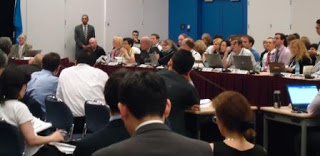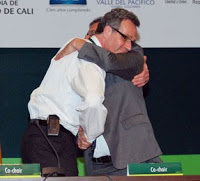
The resumed 9th meeting of the Ad Hoc Open-ended Working Group on Access and Benefit Sharing of the Convention on Biological Diversity (WGABS) began on July 10th in Montreal, Canada. The format for the negotiations is the ‘Cali style’, named after the first time this negotiating method was used at the 9th meeting of the WGABS in Cali, Colombia.
The ‘Cali style’ is a round table involving 5 representatives from each regional group and 2 representatives each from indigenous and local communities, industry, and the research sector. Observers and advisors are allowed to sit behind the negotiators. Negotiators from within each regional group are allowed to exchange places with each other as long as there are only 5 people per region sitting at the table and speaking.
The basis of the negotiations is the ‘Chair’s text’ or ‘revised draft protocol’, which is a text developed by the co-chairs of the WGABS, Tim Hodges (Canada) and Fernando Casas (Colombia). The revised draft protocol was presented by the co-chairs in the Cali round of negotiations and has been described as a delicate balance between the interests of the different Parties and a ‘package deal’ which either has to be accepted as a whole or rejected completely; this disallows the option to pick and choose parts of the text favorable to the different Parties. Parties were instructed to exercise extreme restraint in adding text or bracketing text and asked to find consensus solutions that will not disturb the balance of the revised draft protocol. The negotiations began in earnest at 3 PM in the afternoon after internal coordination meetings and bilaterals between Parties.

The negotiation format requires Parties to negotiate the revised draft protocol, article by article. A consensus was reached around Article 1, which dealt with the objective of the protocol. Parties could not reach an agreement on Article 3, which deals with the ‘scope’ of the protocol. The disagreement amongst Parties was around whether or not the Protocol covers new and continuing uses of genetic resources and associated traditional knowledge accessed prior to the entry into force of the Convention on Biological Diversity. Parties also could not agree on whether pathogens, genetic resources within the commons (i.e. in Antarctica and the high seas) should be excluded or included within the scope of the protocol.
Kabir Bavikatte (Natural Justice) is participating in this final round of ABS negotiations as the legal advisor to the African Group of Negotiators.
Throughout the meeting, daily coverage by IISD Reporting Services can be read here and CBD Alliance (civil society) coverage can be found here.
